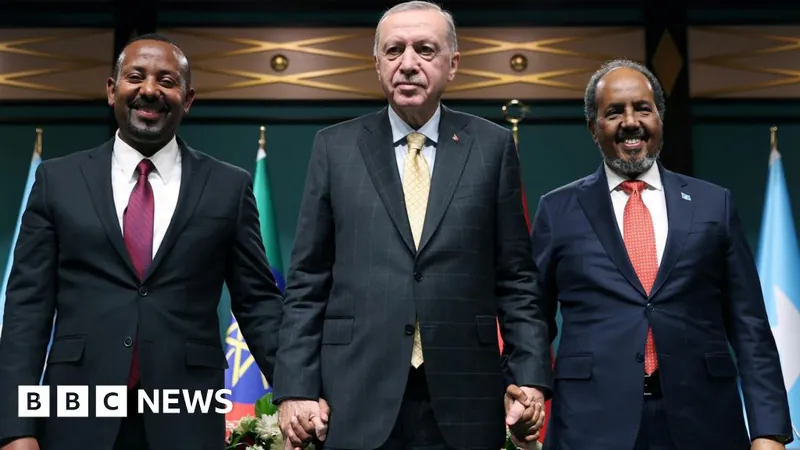
Ethiopia and Somalia Strike Game-Changing Agreement in Turkey to Resolve Somaliland Port Crisis
2024-12-12
Author: Ming
Ethiopia and Somalia Resolve Somaliland Port Conflict
In a landmark development, Ethiopia and Somalia have officially put an end to their ongoing conflict concerning Ethiopia's plans to construct a port in the self-declared republic of Somaliland. This pivotal agreement came about during high-stakes negotiations held in Turkey, exemplifying the increasing geopolitical significance of the Horn of Africa.
Turkish President Recep Tayyip Erdogan heralded this momentous accord as a 'historic agreement.' He emphasized its role in ensuring that landlocked Ethiopia gains crucial access to maritime routes, a strategic necessity for its economic ambitions. This diplomatic breakthrough was marked by a joint press conference in Ankara, where Erdogan stood alongside Ethiopian Prime Minister Abiy Ahmed and Somali President Hassan Sheikh Mohamud, both expressing a renewed commitment to respecting each other's sovereignty.
The tension between Ethiopia and Somalia flared up at the beginning of the year when Ethiopia inked a maritime agreement with Somaliland, which Somalia regards as an integral part of its territory. This rift threatened to escalate into a broader regional conflict, especially considering Egypt's backing of Somalia, partly fueled by its grievances with Ethiopia regarding the Grand Ethiopian Renaissance Dam on the Nile River.
Erdogan described the meeting as a launchpad for a 'new beginning,' while President Mohamud indicated Somalia's willingness to collaborate closely with Ethiopia for mutual benefit. Prime Minister Abiy reassured that Ethiopia's pursuit of reliable access to the sea would not infringe upon Somalia's interests, noting that the two nations had successfully cleared away the misunderstandings that had clouded their relationship over the past year.
The conflict traces back to January 1, when Abiy signed a controversial agreement with Somaliland, enabling Ethiopia to lease a 20-kilometer stretch of coastline for a naval base over 50 years. Unofficially, this deal included recognition of Somaliland's independence, a claim that Ethiopia has not confirmed outright, but has caused a rift with Somalia, which deems such acknowledgment as an act of aggression.
Somaliland, having declared independence from Somalia over three decades ago, has long sought international recognition and strategic partnerships. The recent election of Abdirahman Mohamed Abdullahi as Somaliland's new president may signal a shift, as he pledged to review the contentious maritime agreement during his inaugural address, though he did not elaborate further.
As part of the Ankara joint declaration, Ethiopia and Somalia plan to reconvene in February to engage in technical discussions, focusing on crafting beneficial commercial arrangements that would facilitate Ethiopia's access to the sea while respecting Somalia's sovereignty.
The importance of Somaliland as a strategic gateway to the Gulf of Aden and the Red Sea elevates the stakes of this agreement. As the Horn of Africa navigates through shifting alliances and regional tensions, this deal could potentially reshape the geopolitical landscape, allowing both nations to emerge stronger from the shadows of conflict.
Moreover, the presence of Turkish influence in the region illustrates a growing trend of non-traditional power engagement. With Turkey's interests in both countries, it is poised to continue playing a significant diplomatic role, which could craft new avenues for stabilization and growth in this volatile yet vital region.
As the geopolitical dynamics evolve, the world watches closely: What could this agreement mean for the future of the Horn of Africa? Stay tuned for updates on how these nations' relationships unfold!



 Brasil (PT)
Brasil (PT)
 Canada (EN)
Canada (EN)
 Chile (ES)
Chile (ES)
 España (ES)
España (ES)
 France (FR)
France (FR)
 Hong Kong (EN)
Hong Kong (EN)
 Italia (IT)
Italia (IT)
 日本 (JA)
日本 (JA)
 Magyarország (HU)
Magyarország (HU)
 Norge (NO)
Norge (NO)
 Polska (PL)
Polska (PL)
 Schweiz (DE)
Schweiz (DE)
 Singapore (EN)
Singapore (EN)
 Sverige (SV)
Sverige (SV)
 Suomi (FI)
Suomi (FI)
 Türkiye (TR)
Türkiye (TR)